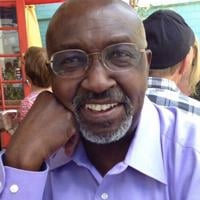In New York City I bought a Covid mask at a pharmacy owned by a South Asian family; two generations of American Indians worked in the shop serving customers. In Washington, DC, I checked an American Indian owned liquor store. On my way back to Colorado I visited a Dunkin Donuts at the airport and was served by a South Asian man and his sons. In many other businesses where I have been a client, I have interacted with more South Asian proprietors than, say, Black Africans or Turks or Arabs. I write about all of this to highlight that Indian Americans are today the most important immigrant minority group. They have excelled in commerce, academia, politics and many other endeavors of American life. This is truly admirable; and for one born in Africa, I can’t but feel a tinge of jealousy.
The Indians who serve the traveler are but a minuscule number in the giant wheel of commerce and industry. Most of us have no concept of where they come from; how and why they are on our streets, hotels, and airports. We are mainly interested in the service rendered; as long as it is acceptable, we are happy. There’s of course a small sad group to whom “foreigners” are anathema; they spill “foreign blood” in our occasional national convulsion of racial antipathy.
For my part, I am impressed by this group that is majority Hindu — 14.2% of Indians are Muslim. The majority come from the higher castes and are therefore better educated and already endowed with greater earning potential. Many come to America to fill highly specialized positions. Indian CEOs of Fortune 500 companies abound; e.g, Microsoft, Google and others.
As I come into contact with them, thoughts of their progress faraway from India, and the significance of the Indian diaspora in America and elsewhere, go through my head. In the beginning, many Indians came to the US to study and most stayed here, becoming part of the Indian diaspora. British imperialists who colonized India dispersed many of them to: South and East Africa, West Indies, Fiji and other Polynesian islands, where they labored constructing railways, and other enterprises. As the British Empire crumbled, Indians stayed behind.
As a result of their ethos of hard work, Indians have done extremely well, even as they have maintained a certain racial purity. They are all Hindus who pray from the same scripture — Bhagavad Gita and strictly observe the caste system, while limiting interpersonal relationships with the “natives.” They are, to a fault, fully family oriented, unlike many Americans to whom family is sometimes an unwelcome impediment. Much to their elders’ chagrin, generational differences do eventually rear their heads. Second and third generation Indians are more assimilated into the American body politic and some, like Vivek Ramaswamy, learn how to behave as outrageously as native born White Americans.
After Donald Trump rhetorically wondered if Kamala Harris was Indian or Black, I was compelled to think about Vice President Harris and Nikki Haley. I understand Trump’s implications when he sets off up that road; for years he spread “birther” rumors against President Barack Obama. Forgotten to Trump is that, being an American and a patriot, means you are willing to defend and sacrifice for the nation. Harris, Haley are, just like Obama was, citizens whose patriotism is unimpeachable.
Patriotism is an abstract concept. You can’t weigh, nor measure it. Our Congressional delegation, Indian Americans included, are patriots — like all of us. The Gold Star father, Khizr Khan whose son was killed fighting in Iraq for America, is a patriot. Indians, Arabs and Hispanics I meet every day, are patriots who would give their all for the nation. Native Americans and Black Americans, people who have toiled in obscurity for centuries, are the greatest patriots — they ask for so little and at times give so much, including their lives. And they are not “suckers.”
America’s next President could very well be Kamala Harris — a Black and Indian American woman. Her parents were a Black Jamaican economist, and an Indian scientist. Harris is an American. I am grateful South Asians have created a space for themselves in our society. They are American citizens, in the same way that Jews and other Europeans are legitimate American citizens — not unlike the original Mayflower Pilgrims. American Indians exist comfortably here, like all other diasporas. They have legitimacy and the right to be Americans.
Pius Kamau, M.D., a retired general surgeon, is president of the Aurora-based Africa America Higher Education Partnerships; co-founder of the Africa Enterprise Group and an activist for minority students’ STEM education. He is a National Public Radio commentator, a Huffington Post blogger, a past columnist for Denver dailies and is featured on the podcast, “Never Again.”
Source link : http://www.bing.com/news/apiclick.aspx?ref=FexRss&aid=&tid=66b89aad581746759482f2f2826c3907&url=https%3A%2F%2Fgazette.com%2Fdenver-gazette%2Findian-americans-have-forged-a-place-in-america-pius-kamau%2Farticle_45c74034-55bf-11ef-83df-53d4dac8af9d.html&c=10338087693685647044&mkt=en-us
Author :
Publish date : 2024-08-10 13:00:00
Copyright for syndicated content belongs to the linked Source.
